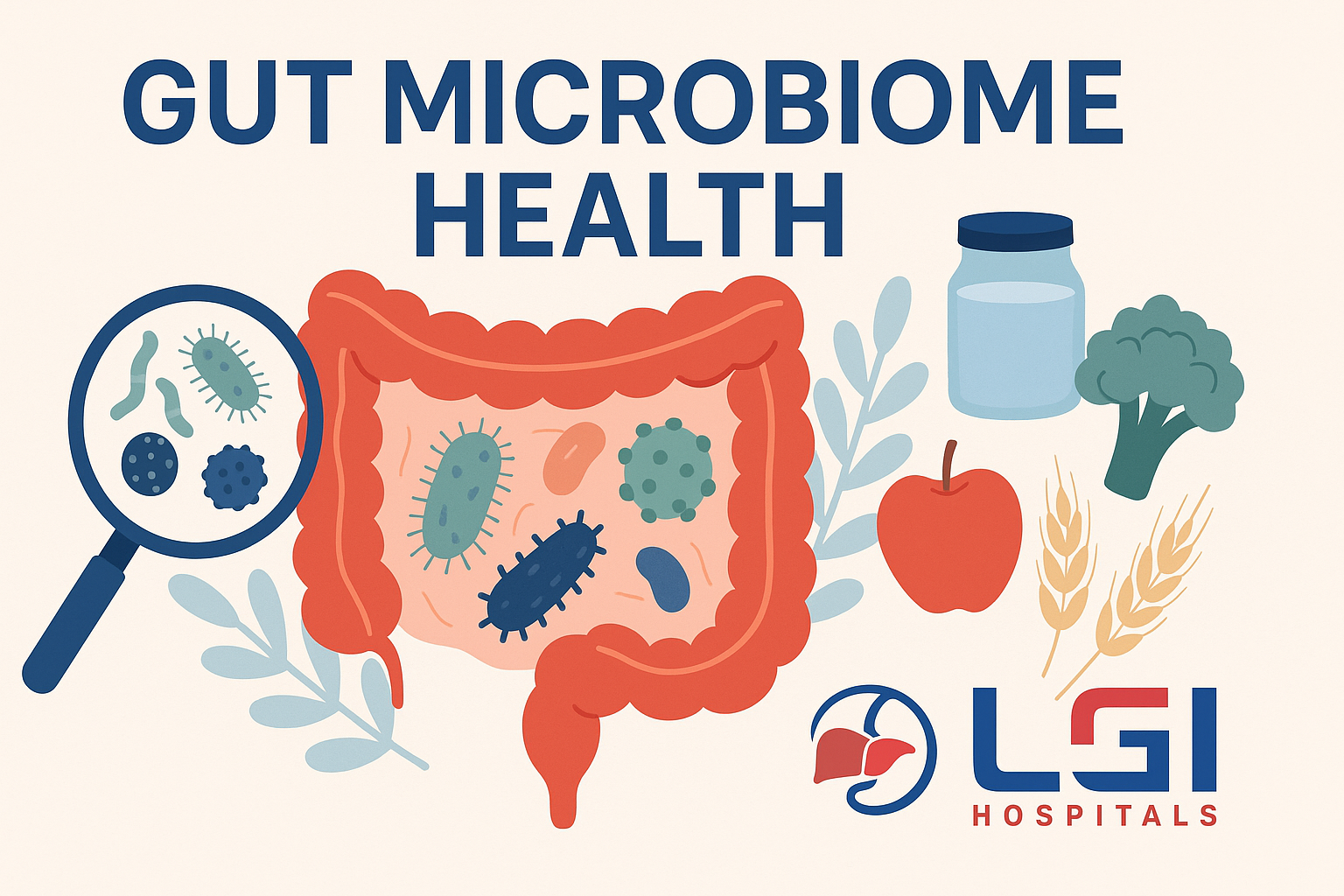The human gut is home to trillions of microorganisms collectively known as the gut microbiome. These tiny residents play a pivotal role in maintaining digestive health, regulating the immune system, and even influencing mental well-being. Understanding gut health has become a focal point in modern medicine, as imbalances in this delicate ecosystem are linked to a range of health problems, including digestive disorders, autoimmune diseases, and metabolic conditions.
In this article, we will explore what the gut microbiome is, why its health matters, factors that influence it, and practical ways to nurture a balanced gut microbiome for improved overall wellness.
What is the Gut Microbiome?
It refers to the diverse community of bacteria, viruses, fungi, and other microorganisms that live in the digestive tract, primarily in the large intestine. This complex ecosystem interacts closely with the human body, performing essential functions such as:
- Aiding digestion and nutrient absorption
- Producing essential vitamins like vitamin K and some B vitamins
- Protecting against harmful pathogens
- Modulating the immune system
- Influencing metabolism and weight management
- Communicating with the brain through the gut-brain axis, affecting mood and cognitive functions
A healthy gut microbiome consists of a diverse and balanced population of beneficial microbes that keep harmful bacteria in check and maintain gut lining integrity.
Why Gut Microbiome Health is Important
Maintaining gut microbiome health is crucial because imbalances, known as dysbiosis, can disrupt normal digestive functions and lead to various health complications. Some common consequences of poor gut microbiome health include:
- Digestive Issues: Conditions like irritable bowel syndrome (IBS), inflammatory bowel disease (IBD), bloating, and constipation are often linked to dysbiosis.
- Weakened Immunity: Since about 70% of the immune system is located in the gut, an unhealthy microbiome can make the body more susceptible to infections and autoimmune diseases.
- Metabolic Disorders: Dysbiosis has been associated with obesity, type 2 diabetes, and metabolic syndrome.
- Mental Health Effects: Research increasingly shows connections between the gut microbiome and mental health conditions such as anxiety, depression, and stress.
- Increased Inflammation: A compromised gut microbiome can trigger chronic low-grade inflammation, which is a risk factor for numerous chronic diseases.
With this growing understanding, healthcare providers at centers like LGI Hospitals emphasize gut health as a foundation for overall well-being.
Factors Affecting Gut Microbiome Health
Several factors can influence the composition and diversity of the gut microbiome, including:
1. Diet
The foods we consume have a direct impact on gut bacteria. Diets rich in fiber, fruits, vegetables, and fermented foods promote beneficial bacteria growth. Conversely, excessive consumption of processed foods, sugar, and unhealthy fats can reduce microbial diversity.
2. Antibiotic Use
While antibiotics are vital for treating bacterial infections, they can disrupt the gut microbiome by killing both harmful and beneficial bacteria. Overuse or improper use of antibiotics may lead to long-term imbalances.
3. Lifestyle
Stress, lack of sleep, smoking, and sedentary lifestyle negatively affect gut health. Chronic stress, in particular, can alter gut bacteria and worsen digestive symptoms.
4. Age and Genetics
Gut microbiome diversity tends to decrease with age. Genetic factors also influence the types and abundance of gut microbes in individuals.
5. Environmental Exposure
Exposure to different environments, pets, and outdoor activities can increase microbiome diversity, while overly sterile environments may limit microbial variety.
How to Promote Gut Microbiome Health
Improving gut microbiome health involves adopting habits that encourage a diverse and balanced microbial community. Here are effective strategies:
1. Eat a Fiber-Rich Diet
Dietary fiber acts as a prebiotic, feeding beneficial gut bacteria. Foods like whole grains, legumes, fruits, and vegetables are excellent sources of fiber. Aim to include a variety of plant-based foods daily to nourish your microbiome.
2. Include Fermented Foods
Fermented foods such as yogurt, kefir, sauerkraut, kimchi, and kombucha contain live probiotics that can help replenish and diversify gut bacteria.
3. Avoid Unnecessary Antibiotics
Use antibiotics only when prescribed and necessary. Discuss concerns with your healthcare provider about potential effects on gut health.
4. Manage Stress and Sleep Well
Incorporate stress reduction techniques such as meditation, yoga, or deep breathing exercises. Ensure consistent and quality sleep to support overall gut health.
5. Stay Active
Regular physical activity has been shown to positively influence the gut microbiome by increasing microbial diversity.
6. Stay Hydrated
Adequate hydration supports digestion and the mucosal lining of the gut.
Medical Advances and Gut Microbiome Research
The field of gut microbiome research is rapidly evolving. Advanced diagnostic tools now allow clinicians to analyze individual microbiomes and tailor interventions accordingly. At LGI Hospitals, gastroenterology specialists use microbiome profiling to better understand patient-specific imbalances and guide personalized treatments.
Emerging therapies like fecal microbiota transplantation (FMT) are gaining traction for treating recurrent Clostridium difficile infections and are being investigated for other gut-related diseases. Researchers are also exploring the use of next-generation probiotics and diet modifications based on microbiome composition.
When to Consult a Specialist
If you experience persistent digestive issues such as bloating, diarrhea, constipation, or unexplained abdominal pain, it’s advisable to consult a gastroenterologist. Early intervention and evaluation of gut microbiome health can prevent progression to more serious conditions.
Healthcare providers at LGI Hospitals offer comprehensive gut health assessments, including stool tests, dietary counseling, and advanced diagnostics, ensuring an integrated approach to digestive wellness.
Finishing it Off
Gut microbiome health is a cornerstone of overall well-being that influences digestion, immunity, metabolism, and even mental health. By understanding the factors that affect the gut microbiome and adopting a lifestyle that supports microbial diversity, individuals can enhance their digestive health and reduce the risk of many chronic diseases.
Thanks to ongoing research and innovative treatments at leading healthcare institutions like LGI Hospitals, the future of gut health management looks promising. Prioritizing your gut microbiome today is a proactive step toward a healthier, balanced life.
